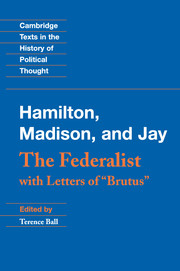Introduction
Published online by Cambridge University Press: 05 June 2012
Summary
The Federalist has long been regarded as a work of political theory at once profound and practical, and an American “classic.” Thomas Jefferson hailed it as “the best commentary on the principles of government which ever was written,” and compared it favorably to John Locke's Two Treatises of Government. “Locke's little book on government is perfect as far as it goes. Descending from theory to practice there is no better book than the Federalist.” Half a century later Alexis de Tocqueville wrote in Democracy in America that
I shall often have occasion to quote The Federalist in this work. When the draft law, which has since become the Constitution of the United States, was still before the people and submitted for their adoption, three men, already famous and later to become even more celebrated – John Jay, Hamilton, and Madison – associated together with the object of pointing out to the nation the advantages of the plan submitted to it. With this intention they published in a journal a series of articles which together form a complete treatise … The Federalist is a fine book, and though it especially concerns America, it should be familiar to statesmen of all countries.
Early in the twentieth century the muckraking Progressive historian Charles Beard excoriated the Constitution as an elitist and anti-democratic document even as he praised The Federalist as “this wonderful piece of argumentation by Hamilton, Madison, and Jay.”
- Type
- Chapter
- Information
- The FederalistWith Letters of Brutus, pp. xiii - xxxiiPublisher: Cambridge University PressPrint publication year: 2003



